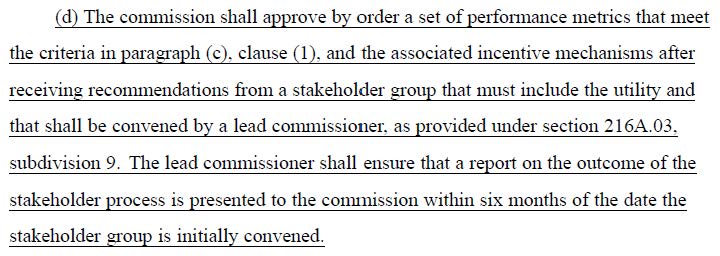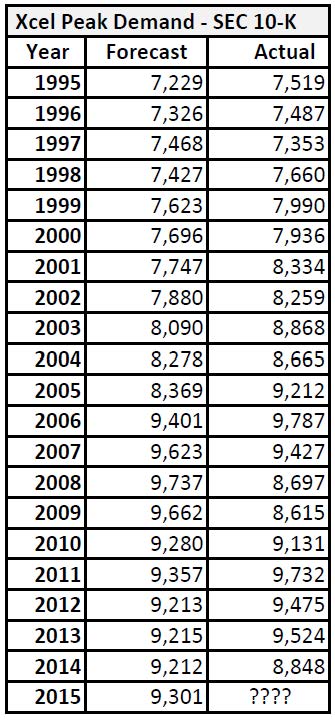the problems with SF 1735…
March 18th, 2015
Please say no to S.F. 1735, a bill that would result in removal of the regulatory protections for rate-payers and the public, and let utilities have the ability to charge us for private costs, and costs that have not been demonstrated to be prudent expenditures.
Little by little, Xcel Energy’s e21 Initiative is slithering into bills before the House and Senate Energy Committees.
Before anyone can vote on these bills, they should read Alfred Kahn’s “The Economics of Regulation,” both Volume 1 and Volume 2.
What’s e21 Initiative? Here’s what Xcel filed at PUC, docket 14-1055:
Tomorrow, S.F. 1735 (see companion HF 1315)and S.F. 1431 are in Committee, and they’re supposed to vote on the Energy Ominous bill.
What’s up with S.F. 1735? Well, check out this version, with yellow highlighting (and this is NOT all-inclusive):
SF 1735doesn’t have the part about “Competitive Rate for Energy-Intensive Trade-Exposed Electric Utility Customer” part that HF 1315 does, though we’ll see what the mines and Koch Refinery have to say about that when the Energy Ominous bill comes together and everyone has their hand out and foot in the door.
SF 1735 is a problem because… where to start… the first problem is that it proposes, as Xcel does in e21, a BUSINESS PLAN which “replaces a general rate case filing,” REPLACES! The standard it must meet is that it result in “just and reasonable rates,” and there’s nothing about “prudent” and there’s nothing about being in the public interest. DOH!
And dig how it would be approved — they SHALL approve:
Stakeholder group… right, we know who that is, and we sure know who that isn’t! And that’s the e21 Initiative mantra, stakeholders, and from who was included in e21, we know who would be deemed a stakeholder — all those who have done deals with Xcel Energy! Oh, and DOH, they want approvals at the PUC based on “Settlement Agreements.” Right, like the one that opened the door and welcomed CapX 2020 transmission, and that horriffic “it’s a deal, it’s a package deal, and it’s a good deal” of the 2005 Ch 97 – Transmission Omnibus Bill from Hell with Xcel transmission perks, CWIP and C-BED :
PUC decision based on “stakeholders” and deals with Xcel Energy? No, I think not.
Per the House hearing on HF 341 (see also S.F. 237), Minnesota should now be an electricity exporter, which is one between-the-lines goal of e21 Initiative, the others being ability to build without demonstrating need, to use ratepayer money for market development, to eliminate contested cases and use “Settlement Agreements,” which they’ve done expertly in the past. Exporting for profit is doable, now that we have the transmission in place. It would help Xcel Energy to just get rid of that Certificate of Need requirement, which HF 341 would do for natural gas plants of any size, i.e., 800 MW (like the LS Power Sunrise Station proposed for Chisago County, Lent Township) if it’s for sale into the MISO market. As you know, also up for consideration is SF 306 & 536, HF 338, which would lift the nuclear prohibition and allow a CoN for Monticello or anywhere. There’s no need, instead there’s excess generation, but that electricity could also go into the market, and with Construction Work in Progress, Minn. Stat. 216B.16, Subd. 6a, we ratepayers could pay for that private market activity. NO. NO. NO.
NO!
The situation we’re in is NOT new to Xcel or any other utility.
- Distribution system is utility responsibility as franchise holder and regulated utility, but they’ve neglected the distribution system over decades. They have chosen not to upgrade and not to bring it into the 21st Century. That neglect is not ours to correct. Xcel has twice tried to invade and inflict communities with transmission when they had identified a distribution system deficit — Hiawatha and Hollydale. NO!
- Transmission deficit a decade ago was caused by putting so many IPP gas plants on line without requiring transmission upgrades. This is reflected in the TLTG tables for the SW MN 345 kV line, PUC Docket 01-1958. It also became an issue when Big Stone II was proposed because at that time it was “cause cost pays” and they hadn’t been charging gas plants but were going to charge BSII for interconnection costs, and BSII objected (see “standstill agreement” and withdrawal of Bill Gates’ Cascade Investment from that project at Legalectric: Bill Gates & Otter Tail at the PUC Tuesday…). That transmission CoN was denied, approved, and plant was withdrawn so non-issue. Then utilities and paid-for-NGOs went to MISO and FERC to find a way to spread the payment of transmission construction costs around, which they did. The ones building it are not necessarily the ones paying for it, and it’s us ratepayers paying for transmission construction all around the country (See Schedule 26A, MISO Tariff, also Tariff MM) and the PUC has yet to address whether that should be paid for by us — but wait, it’s FERC rates, so the PUC has no say… well, that MISO MVP bill hasn’t come before the PUC yet, and that’s the last thing Xcel wants. That capital cost is for private purpose transmission (market transactions) and as such, it is not ours to pay.
- Generation changed decades ago too, moving away from utility construction and ownership, collect revenue for that, and now it’s morphed to an IPP (Independent Power Producer) mode where a third party takes on risk and cost of construction and sells power to utilities. It’s been that way for decades. Xcel has done some coal plant update, and nuclear update/uprate (grossly over budget by factor of 2+), but no new plants. This shift from that regulated revenue stream was a business choice of utilities, but now they’re looking to make up that revenue that they don’t get for building the plants. That business choice is not ours to “fix.”
- Rates — Utilities want out of rate cases! Of course they’d want that, Xcel has lost ground in their rate demands the last few rounds. A Business Plan is not adequate, however, they need to prove up their expenditures if they expect us to pay them, and we should not, must not, be assessed for their market private purpose expenses, like transmission for export. The bills for CapX 2020 ($2 billion) and for MISO MVP projects ($5.2 billion across Midwest) are the types of large expenses that they do not want to have to justify. Not wanting to go through a rate case is no reason for us to let go of that protective review, or to let them charge us for things that are not public purpose expenditures necessitated by their obligation to provide universal service under their franchise.
- Deregulation — this “e21 Initiative” looks and feels like the 2000 deregulation push to me, particularly with all the support from “environmental” and “advocacy” organizations, well funded, and funded I believe by Xcel and cronies (and that information should be made public). Utilities wanted deregulation (back when Enron and Xcel’s NRG was making 300% profits screwing over California in an orchestrated rate skyrocket) and at that time, Xcel had all the “environmental” organizations behind it as “inevitable restructuring.” Everyone was jumping on the deregulation bandwagon, all bozos on that bus, and that’s how this e21 feels. Lots of people agreeing without knowing what they’re talking about, without understanding the consequences. Back in that earlier deregulation push, the utilities also had everyone on board to pay them “stranded costs” for their large generating plants. Thankfully the A.G. stood up to that pointing out that deregulation is a disaster where ever it goes, and that the claimed “stranded costs” were really stranded assets, and if anyone owed anyone money, the utilities owed us for their assets that were paid for and fully depreciated. Read Corneli on Stranded Assets.
This is not new to utilities. It is not our job to correct their business plan errors, to pay for their neglect, or to finance their market activities.
More on this soon… but the short version, NO to SF 1735. NO to SF 1431.
NO! NO! NO!
It’s not in the public interest.
And by the way, the “WE NEED MORE” histrionic mantra that you year year after year is false. Excess generation? Yes — here’s the peak demand that Xcel Energy has reported on its SEC 10-K filings since 1995:
Also from the 2014 SEC 10-K link:
 |
The question to ask is “What’s stopping utilities?” And it’s not our regulatory system. It’s that utilities are looking for additional ways to transfer their costs to ratepayers without regulatory review.



Leave a Reply